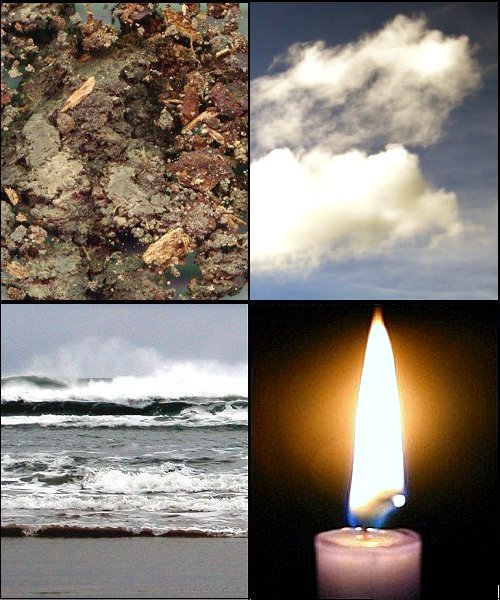Earth, Air, Fire, & Water
Today, Earth, Air, Fire, and Water. The University of Houston's College of Engineering presents this series about the machines that make our civilization run, and the people whose ingenuity created them.
Western chemistry grew up around alchemical ideas of Earth, Air, Fire, and Water. They're called the Aristotelian elements, but they originated with a much earlier thinker -- the Sicilian aristocrat, Empedocles of Acragas.
Not many of Empedocles' writings have survived, and a large mythology now hovers over his person. We have fragments of two book-length poems One was an exploration of nature itself. The other dealt with personal salvation.
He probably wrote plays, and treatises on medicine, as well. Aristotle credited Empedocles with inventing rhetoric, and with the idea that light moves at a finite speed. But Empedocles is best known for claiming that all matter is formed when the opposing forces of Love and Hate act upon the four elements -- Earth, Air, Fire, and Water.
He also gave us an early theory of natural selection. His biographer Alexander Mourelatos tells how he explained the origins of animals by "imagining random combinations of stray limbs and organs." At first, those combinations produced only monsters, but viable arrangements eventually emerged; and they survived.
Although Darwin quoted Aristotle's discussion of Empedocles' evolutionary ideas, Empedocles stopped where Darwin began. His creatures, once randomly created, were either fit to survive or not. Darwinian natural selection continued from that point -- im-proving the ability of living things to function.
So many remarkable ideas well up from Empedocles. He talked about matter and mechanical force, about attractive and repulsive forces, about mass and energy conservation. Freud wondered aloud if his own views of Love and Hate were subconsciously influenced by his early readings about Empedocles.
No force as large as Empedocles could reach us, all the way from prehistory, without picking up legends along the way. One such legend tells about how he was so convinced of his own immortality that he leapt into the crater of Etna. In another, he simply ascended into the sky. Mourelatos tells how, in the nineteenth century, Sicilian supporters of Garibaldi took Empedocles as the prototype of their hero -- the aristocrat in a populist cause.
When Aristotle got his hands on Earth, Air, Fire, and Water, the world shifted. Now the external forces that acted upon the essences would no longer be Love and Hate. Now their physical counterparts transmuted matter -- heat and cold, or dampness and dryness. The evolution of chemistry was beginning.
So Empedocles still rises like smoke from Etna. He reminds us that the primal scientific issue may not be a simple matter of judging what is true and false. Perhaps science is the business of recognizing ideas that have the capacity for evolving into ever more useful explanations of the vast cosmos around us.
I'm John Lienhard, at the University of Houston, where we're interested in the way inventive minds work.
A. P. D. Mourelatos, Empedocles of Acragas. Dictionary of Scientific Biography (C.C. Gilespie, ed.). New York: Charles Scribner's Sons, 1970-1980.
Click here for more on Empedocles.

(photos by John Lienhard)